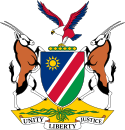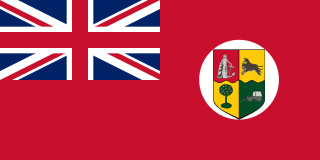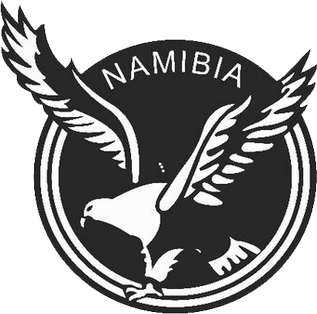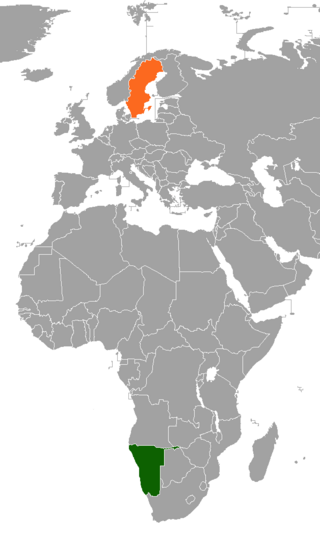 |
|---|
Namibia Women's Action for Equality Party was a political party in Namibia. It was formed on 20 July 1994 by Ilenikelao Nhinda Latvio. The party never gained many members and never took part in an election. [1]
 |
|---|
Namibia Women's Action for Equality Party was a political party in Namibia. It was formed on 20 July 1994 by Ilenikelao Nhinda Latvio. The party never gained many members and never took part in an election. [1]

Namibia, officially the Republic of Namibia, is a country in Southern Africa. Its western border is the Atlantic Ocean. It shares land borders with Zambia and Angola to the north, Botswana to the east and South Africa to the south and east. Although it does not border Zimbabwe, less than 200 metres of the Botswanan right bank of the Zambezi River separates the two countries. Namibia gained independence from South Africa on 21 March 1990, following the Namibian War of Independence. Its capital and largest city is Windhoek. Namibia is a member state of the United Nations (UN), the Southern African Development Community (SADC), the African Union (AU) and the Commonwealth of Nations.

Politics of Namibia takes place in a framework of a semi-presidential representative democratic republic, whereby the President of Namibia is both head of state and head of government, and of a pluriform multi-party system. Executive power is exercised by both the president and the government. Legislative power is vested in the two chambers of Parliament. The judiciary is independent of the executive and the legislature.

Walvis Bay is a city in Namibia and the name of the bay on which it lies. It is the second largest city in Namibia and the largest coastal city in the country. The city covers a total area of 29 square kilometres (11 sq mi) of land.

South West Africa was a territory under South African administration from 1915 to 1990, after which it became modern-day Namibia. It bordered Angola, Botswana, South Africa, and Zambia.
The history of Namibia has passed through several distinct stages from being colonised in the late nineteenth century to Namibia's independence on 21 March 1990.

Windhoek is the capital and largest city of Namibia. It is located in central Namibia in the Khomas Highland plateau area, at around 1,700 metres (5,600 ft) above sea level, almost exactly at the country's geographical centre. The population of Windhoek in 2020 was 431,000 which is growing continually due to a continued migration from other regions in Namibia.

A Bantustan was a territory that the National Party administration of South Africa set aside for black inhabitants of South Africa and South West Africa, as part of its policy of apartheid. By extension, outside South Africa the term refers to regions that lack any real legitimacy, consisting often of several unconnected enclaves, or which have emerged from national or international gerrymandering.

The South West Africa People's Organisation, officially known as the SWAPO Party of Namibia, is a political party and former independence movement in Namibia. Founded in 1960, it has been the governing party in Namibia since the country achieved independence in 1990. The party continues to be dominated in number and influence by the Ovambo ethnic group.

Hardap is one of the fourteen regions of Namibia, its capital is Mariental. Hardap contains the municipality of Mariental, the towns Rehoboth and Aranos, and the self-governed villages Gibeon, Gochas, Kalkrand, Stampriet and Maltahöhe. It is home to the Hardap Dam.

Erongo is one of the 14 regions of Namibia. The capital is Swakopmund. It is named after Mount Erongo, a well-known landmark in Namibia and in this area. Erongo contains the municipalities of Walvis Bay, Swakopmund, Henties Bay and Omaruru, as well as the towns Arandis, Karibib and Usakos. All the main centres within this region are connected by paved roads.

The Namibia national football team represents Namibia in men's international football and is controlled by the Namibia Football Association. They have never qualified for the FIFA World Cup but have made three appearances in the Africa Cup of Nations. The team represents both FIFA and Confederation of African Football (CAF).

Elections in Namibia determine who holds public political offices in the country. Namibia is a semi-presidential representative democratic republic. It runs direct elections every five years for the position of the president and seats in the National Assembly, and every six years for the Regional Councils and the distribution of seats in local authorities. The National Council is elected indirectly by the constituency councillors of Namibia's 14 regions.

The Popular Democratic Movement (PDM), formerly the Democratic Turnhalle Alliance (DTA), is an amalgamation of political parties in Namibia, registered as one singular party for representation purposes. In coalition with the United Democratic Front, it formed the official opposition in Parliament until the parliamentary elections in 2009. The party currently holds 16 seats in the Namibian National Assembly and one seat in the Namibian National Council and is the official opposition. McHenry Venaani is president of the PDM.
The United Democratic Front (UDF) is a political party in Namibia. Justus ǁGaroëb founded the party in 1989 and led it until 2013. He was succeeded by Apius Auchab.

Hage Gottfried Geingob is a Namibian politician, serving as the third president of Namibia since 21 March 2015. Geingob was the first Prime Minister of Namibia from 1990 to 2002, and served as prime minister again from 2012 to 2015. Between 2008 and 2012 Geingob served as Minister of Trade and Industry. He is also the current president of the ruling SWAPO Party since his election to the position in November 2017.

Albert Mishake Muyongo is a Namibian politician and former Member of Parliament who is currently living in exile in Denmark.

The Turnhalle Constitutional Conference was a conference held in Windhoek between 1975 and 1977, tasked with the development of a constitution for a self-governed Namibia under South African control. Sponsored by the South African government, the Turnhalle Conference laid the framework for the government of South West Africa from 1977 to independence in 1989.

Namibia–Sweden relations refers to the current and historical relationship of Namibia and Sweden. Namibia maintains an embassy in Stockholm, while Sweden closed its embassy in Windhoek in 2008. Sweden was a strong supporter of the Namibian independence movement. From Namibia's independence in 1990 until 2007, Sweden was a primary donor of aid to develop Namibia's public sector but, in 2007, development aid began to be scaled back.

The Namibian Economic Freedom Fighters (NEFF) is a political party in Namibia. It was formed in June 2014. The party has close links to the South African Economic Freedom Fighters. Economically, the two parties are similar, with the NEFF describing itself as a pro-freedom, anti-capitalist and anti-imperialist movement, to be against foreign exploitation of the country's natural resources, and proposing that land and its natural resources be owned by indigenous people.

General elections were held in Namibia on 27 November 2019. Ballots were cast using electronic voting. A total of eleven candidates ran for the presidency and fifteen political parties contested the National Assembly elections.